Now in the 18 months or so that I’ve been in Australia I’ve travelled and fished many places on this beautiful continent but I’ve never been deep into the bush so I very much welcomed the opportunity to attend the recent Leeton Bidgee Classic fishing tournament as a guest of the Fishers for Fish Habitat Network and to share a few thoughts on how we look after our rivers and the important wildlife that they contain.
I was also looking forward to catching my first Murray Cod but sadly that didn’t happen although some fine fish were landed over the course of the weekend.
I first came out to Australia after spending 26 years in frontline politics in the UK. I decided to retire from the House of Commons at the 2010 election as I wanted to concentrate on campaigning on the things I care about rather than the things my constituents wanted me to do.
My love for rivers, fishing and the environment was of course shared by many of the people I represented both on my local council and later in my parliamentary constituency. I was extremely fortunate to be able, at times, to combine business with pleasure when I was appointed as Parliamentary Spokesman for Angling by Tony Blair and later on by Gordon Brown.
My job was to be the interface between the recreational fishers and the government and as a lifelong, passionate angler it couldn’t have been a more perfect role for me to play.
It was in that role that I helped bring the various groups together to set up the unified peak body for recreational fishing in England – called the Angling Trust – and which I now work for as their head of campaigns.
But first to the fishing…
First fish
Leaving a wet and freezing London and arriving to 30 degrees of blazing sunshine is always a shock to the system but is something I can cope with!
Jet lag after a 23 hour flight plays havoc with my sleep patterns for the first three days but it does mean that I’m awake well before dawn and can be on the water for first light. My mate Ollie told me that there had been a few kingfish showing in one of our favourite Sydney Harbour bays so I went down there to throw a few poppers and soft plastics around. The kingies were not at home but a nice Aussie salmon did a passable impression of one and I was off the mark.
The next day my old mate and Aussie fishing celebrity Al McGlashan kindly offered to take me marlin fishing. Al reckoned that 2016 had been the best marlin season in New South Wales for years and although things had quietened down a bit we were still in with a chance of getting a Blue if we went wide out of Sydney. It turned out that he wasn’t wrong and just as it looked like being a blank day we had a screaming take and young Thomas Eisenhammer – I guy I had fished with back in 2010 – took the rod and expertly brought 160lbs of extremely angry blue marlin to the boat where Al tagged and released it. It would have been great to have had three takes giving us all a chance of a fish, and this had been happening quite regularly this season, but marlin fishing is a team effort so we all basked in the reflected glory of Tom’s capture.
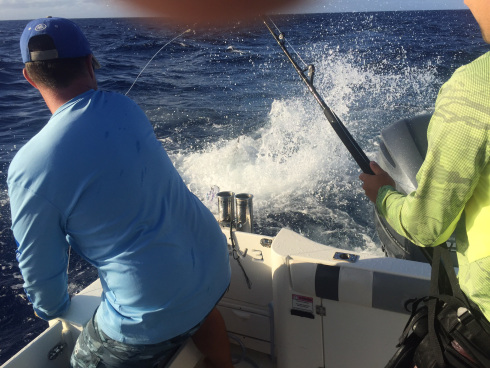
Al McGlashan takes the leader as an angry Blue Marlin comes to the boat.
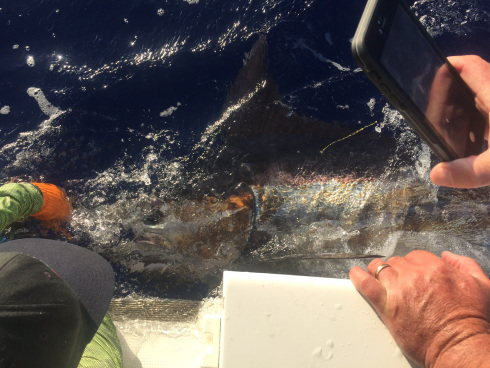
Safely tagged and ready for release – something that should be the norm for all marlin anywhere in the world.
Australia is a country of extremes and there’s no two forms of fishing out here as far apart as chasing marlin with 24 kgs game tackle on the open ocean and targeting blackfish from the rocks on float gear and 3kgs hook lengths. However, I love it all and my mate and fellow Fishing World contributor John Newbury is an acknowledged expert at this style of fishing. John and I have a shared interest in politics, conservation and rock fishing and we’ve recorded some good catches in the past so I was really looking forward to our day out together.
For once the blackfish didn’t want to play and despite trying two of our favourite north shore marks only three fish came our way and none of them to my rod.
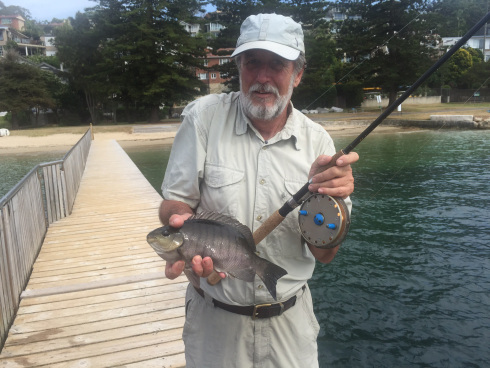
John Newbury – doing what he does best and catching blackfish on float tackle and green weed.
Top End trials
Now it is almost rude to spend a few weeks in Oz and not go to the tropical Top End for some of the great barramundi and blue water action that is to be found up there. Plus a trip up to Darwin provided the perfect opportunity to catch up with Jim Harnwell – the former editor of Fishing World and my pommie mate and top fisho Phil Bolton who now lives down on the south coast.
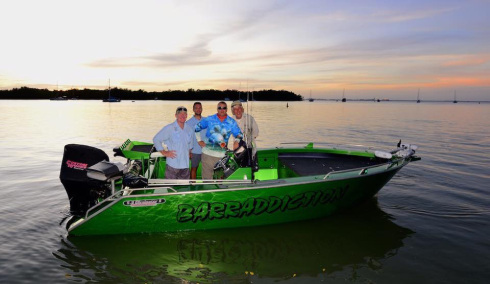
All aboard the Green Machine with Pete Zeroni – also known as ‘The Angry Dragon’
We were guided by the legendary Peter Zeroni who took us out in his fantastic boat Barraddiction also known as the Green Machine for obvious reasons. And on one of the days we were joined by Warren ‘Wazza’ Smith who knows more about fishing in this region than almost anyone. The Northern Territory is a beautiful but unforgiving part of Australia with stifling heat and humidity one minute and violent electrical storms arriving the next. We got caught in a couple crazy ones where the wind went from five to fifty knots in the blink of an eye and with those crocs about tipping the boat over was not really a good thing to do.
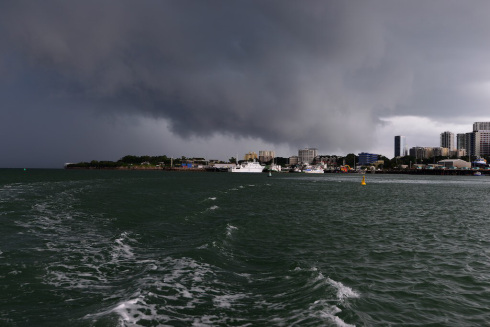
The storm is about to hit us before we could make the boat ramp at Darwin
Unfortunately, there had not been a good wet season up north this year so the barra weren’t really fired up and feeding themselves silly on the baitfish pouring off the floodplain. This wouldn’t have been a problem as we were planning to spend two of our three days out wide chasing Spanish Mackerel and Queenies but the great big tropical low that brought those storms had also dirtied up the blue water so this option was closed to us. Luckily Pete and Wazza can always find a feeding fish somewhere and although we didn’t break any records a few nice barra came our way with Phil and Jim landing good size specimens on the troll from the South Alligator River. We also managed a few Queenies and a range of other species by throwing small jigs and poppers in and around Darwin Harbour but sadly the elusive milkfish for which this area is famous were nowhere to be seen.
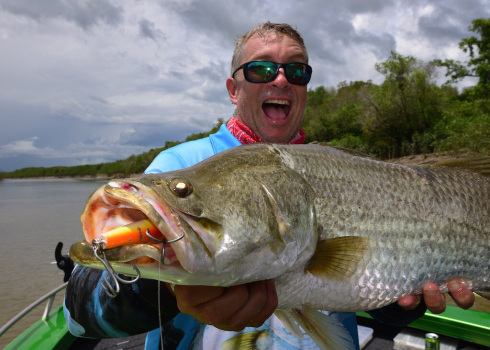
Jim Harwell looking pleased with his big Barra
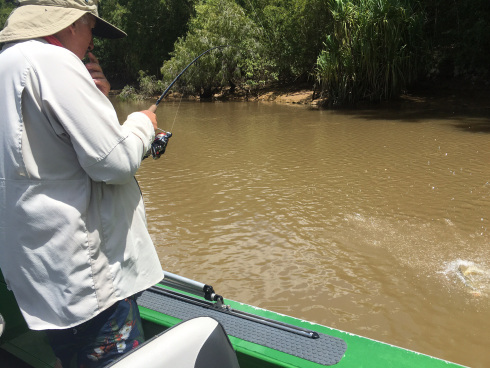
Hooked up on an Adelaide River Barra
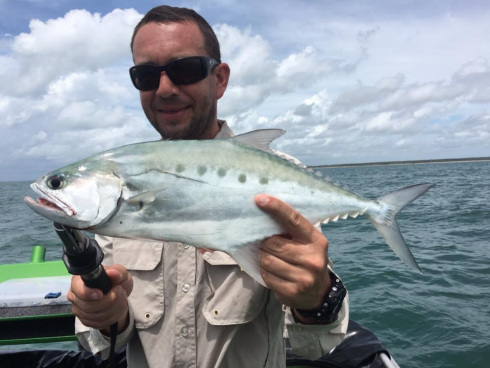
Phil with a modest queenfish from Darwin Harbour
Now that I’m back safe and sound in Sydney and already thinking about when I can next visit the ‘Top End’ and spend some time with the hardy souls that call this place their home.
Back to Leeton Bidgee
I’ve attended plenty of fishing competitions in the UK but nothing quite like the Leeton Bidgee Classic. This is a genuine community event in a sparsely populated part of rural Australia that attracts close to a thousand people over the three days that it takes place and raises money for the re stocking of Murray Cod and yellow perch into the Murrumbidgee River. The fishing is from both boat and bank and there are $35,000 worth of prizes and the chance to win a great trailer boat. Entertainment is provided every evening and everyone camps by the river at a great site just outside town at Gogeldrie Weir.
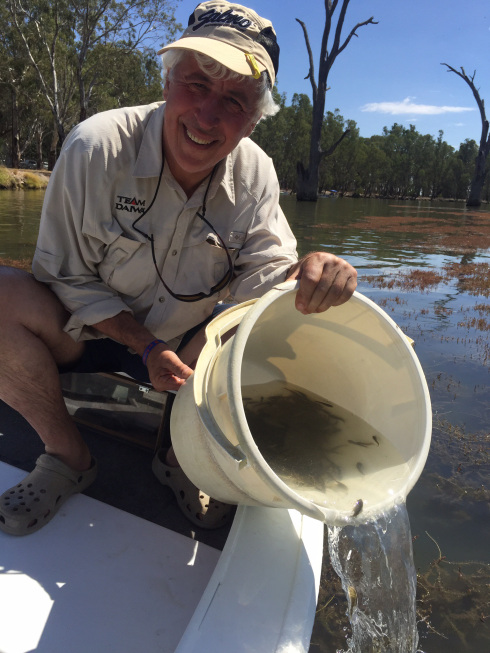
Helping out with the annual restocking on the Murrumbidgee River in NSW as part of the Leeton Bidgee Classic
I was accompanied by Scott Nichols from the Aquatic Habitat Rehabilitation Unit of NSW Fisheries and we received a wonderful warm welcome from both organisers and competitors. We even got to help out with the re stocking and give interviews to the local paper promoted the work of the Fish Habitat Network.
Here’s some of what I said in my speech at the prize giving ceremony:
“We are all here because we love fishing and we want our kids and their kids to be able to enjoy fishing as much as we do. So here’s three suggestions..
1) Stop doing harm
No more ripping out important bank side vegetation, stop people dumping bad stuff on the land that washes into rivers and kills fish, get those irrigation pumps screened so we reduce fish mortalities, maintain a minimum environmental flow in the river, remove barriers to fish migration and try and manage cold water discharges so they don’t damage fish spawning cycles.
None of this is rocket science and it’s been done in Europe, the UK, the USA and in Canada and you can do it here.Pump screening is the most obvious one to me. I looked at some figures yesterday that showed a staggering12,000 fish per day extracted from a 12 inch pipe on the Condamine River in QLD while on some of the NSW rivers they counted 240 fish per day being lost to the system. In NSW alone you have 4546 pumps with a 200mm pipe diameter. This equals an awful lot of fish being removed – far too many to keep your fisheries sustainable. There is direct loss of fish through shearing as they pass through the pumps but, as you know, there is also loss from the natural system to canals that feed irrigation districts, but have no way of allowing fish to get back to the river channels.And before anyone tells you it can’t be done be aware that in many countries the fitting of fish screens is a requirement of any major abstraction licence.
2) Start making it better
Let’s get those all important buffer strips along every possible km of river to provide habitat for fish and wildlife Let’s look at narrowing and speeding up flows to create better spawning grounds. And of course it’s great that events such as the Leeton Bidgee Classic are raising cash for much needed restockings but we need to recognise that this can only be part of the solution. We need to to let the fish breed and to create habitat that allows this to happen.The big one on Australian river systems is re-snagging and we know this works.
The Murray River Re-snagging programme in 2006/7 saw a threefold increase in the Murray Cod population following the introduction of over 4,000 large snags so this has to be a no brainer and is a great way to get fishos involved in improving their own fishing.
3) Support Fishers 4 Fish Habitat
I’m proud to be over here to support and promote the work of Scott Nichols, Craig Copeland and their team in the Fish Habitat Network.We all believe passionately that the only way these things will get fixed is with concerted efforts from recreational fishers. That means getting involved and engaged and not just assuming someone else will do it for you because life ain’t like that. Craig has travelled a fair bit on a Churchill Scholarship and looked at good practice from around the world including the work we do in the UK at the Angling Trust. They have formed a group modelled on our successful US sister organisation Trout Unlimited – which is called called Ozfish Unlimited. This has the backing of people like Steve Starling and Michael Guest. It’s basically a national fish habitat advocacy network and you can join and find out more at ozfish.org.au
It’s a sad fact of life that Fishers in the UK or America are three times more likely to get involved in habitat issues than here in Australia – and that simply has to change and I’ve no doubt that it will.
f course your fisheries will never be absolutely perfect in a challenged landscape with climatic extremes and population pressures but I know we can do better and we have to do better if want good freshwater fishing for future generations”
More fishing to come
So far the fishing has not produced anything too dramatic but I’m only halfway through my stay out here and I always travel in hope. Later today I’m driving three hours north of Sydney up to meet up with my mate Ben Doolan, another NSW Fisheries guy and top angler. We are going to be targeting long tail tuna and big kingfish out of Port Stephens which is one of the prime fishing locations on the Central Coast.
STOP PRESS>>>>>>>>>>>>
Last night was a success. In the company of Ben ‘ Fishfinder General’ Doolan I finally caught something a bit special in the shape of a beautiful 35lbs longtail tuna on a mackerel live bait. I’ve had longtails before but not of this size and it gave a great fight before coming alongside Ben’s rather diminutive boat in a rolling swell.
Hopefully my luck has changed and a few more big fish will come my way before I have to fly back to Blighty.

Success at last in the shape of this fine longtail tuna caught on a float fished mackerel livebait in a short evening session with top NSW angler Ben Doolan










